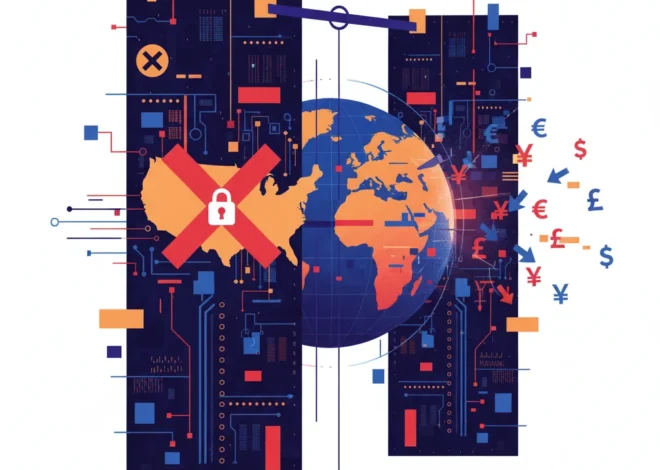
Grounded Flights, Grounded Economy: The Hidden Financial Turbulence of a Government Shutdown
The sight of departure boards lit up with cancellations is more than just an inconvenience for travelers; it’s a potent symbol of a system under stress. Recently, the skies over the United States grew quieter as more than 1,400 flights were cancelled and thousands more delayed, a direct consequence of air travel capacity reductions during a federal government shutdown. While the immediate story is one of stranded passengers and logistical chaos, the real narrative for investors, business leaders, and financial professionals lies in the economic shockwaves that radiate from the tarmac into the heart of our financial markets.
This isn’t just about airlines. It’s about consumer confidence, supply chain integrity, and the perceived stability of the world’s largest economy. When a core function like air traffic control falters due to political gridlock, it forces a critical reassessment of systemic risk and its impact on everything from individual stock performance to the macroeconomic outlook. Let’s delve into the cascading financial effects of this disruption and explore what it means for the broader landscape of finance, investing, and the economy.
The Immediate Economic Fallout: More Than Just Lost Ticket Revenue
The airline industry operates on notoriously thin margins. A grounded fleet represents a massive, immediate loss of revenue against a backdrop of fixed costs—aircraft leases, maintenance, and non-furloughed staff salaries. But the financial bleeding extends far beyond the carriers themselves. The entire travel and tourism ecosystem, a significant driver of the national economy, feels the pain.
Consider the interconnected network of businesses that rely on air travel:
- Hospitality: Hotels and resorts face a wave of cancellations, leading to lost bookings and decreased occupancy rates.
- Transportation: Rental car agencies, taxi services, and ride-sharing platforms see a sharp decline in demand at airports.
- Retail and Food Services: Airport vendors, from high-end shops to fast-food chains, lose a captive audience of thousands of travelers per day.
- Corporate Travel: Business deals are postponed, conferences are missed, and crucial face-to-face meetings are cancelled, creating a drag on commercial activity and productivity.
The cumulative effect is a significant, albeit temporary, brake on economic activity. Past government shutdowns have provided a clear model for this impact. The 35-day shutdown in 2018-2019, for instance, was estimated by the Congressional Budget Office to have reduced real GDP by approximately $11 billion, of which $3 billion was permanently lost. A significant portion of this damage can be attributed to disruptions in federal services and the subsequent chilling effect on private sector confidence and spending.
Beyond the Banks: Hezbollah's Pivot to Fintech and What It Means for Global Finance
This disruption also has a tangible impact on the stock market. Airline stocks are often the first to react, with investors pricing in the lost revenue and potential for long-term brand damage. The table below illustrates the immediate sensitivity of airline stocks and related sectors to such operational crises.
| Sector / Industry | Potential Immediate Impact | Key Financial Metrics to Watch |
|---|---|---|
| Airlines (e.g., AAL, UAL, DAL) | Negative – Sharp drop in share price due to revenue loss and operational chaos. | Passenger Revenue per Available Seat Mile (PRASM), Load Factor, Daily Cash Burn. |
| Online Travel Agencies (e.g., BKNG, EXPE) | Negative – Decreased booking volumes and increased customer service costs. | Gross Bookings, Net Income. |
| Hotel & Resort Chains (e.g., MAR, HLT) | Negative – Lowered revenue forecasts due to travel cancellations. | Revenue per Available Room (RevPAR), Occupancy Rates. |
| Logistics & Cargo (e.g., FDX, UPS) | Mixed – Air cargo can be disrupted, but some demand may shift to ground transport. | Package Volume, Revenue per Shipment. |
From Political Risk to Market Volatility: An Investor’s Perspective
For those engaged in investing and trading, events like a government shutdown serve as a stark reminder of the importance of pricing in political risk. While market fundamentals, corporate earnings, and economic data are the traditional pillars of analysis, the unpredictable nature of politics can override them all in the short term. The CBOE Volatility Index (VIX), often called the “fear index,” typically spikes during periods of high political uncertainty, reflecting increased hedging and investor anxiety.
Historically, the stock market’s reaction to government shutdowns has been surprisingly resilient over the medium term. Analysis by LPL Financial shows that during 21 government shutdowns since 1976, the S&P 500’s performance was often flat or even slightly positive, with an average return of 0.0% (source). The market, it seems, has learned to look past the short-term noise, trusting that a resolution will eventually be found. However, this historical data can be misleading. A prolonged shutdown, or one that coincides with other economic headwinds like high inflation or rising interest rates, could create a far more severe market reaction.
Modern trading strategies increasingly leverage financial technology to react to these events in real-time. Sophisticated algorithms scan news feeds and social media for keywords related to political instability, executing trades in milliseconds to capitalize on the resulting volatility. This high-frequency trading can exacerbate short-term market swings, making it a challenging environment for the average retail investor.
The Role of Fintech and Modern Banking in Mitigating Disruption
While the problem is rooted in politics, the solutions for those affected are increasingly found in technology. The fintech revolution has equipped individuals and businesses with powerful tools to manage financial uncertainty. For travelers stranded by cancellations, this means mobile apps that can process travel insurance claims instantly, neobanks that offer immediate fee-free access to funds abroad, and flexible payment platforms that make rebooking less of a financial burden.
For small businesses in the travel sector, modern banking and financial technology offer a lifeline. Digital invoicing systems, rapid access to short-term credit lines, and sophisticated cash flow management tools can help them weather the sudden drop in revenue. This is a far cry from the analog world of a decade ago, where a similar crisis would have meant lengthy waits for insurance payouts and cumbersome processes for accessing emergency capital.
Furthermore, the data generated by these disruptions is a goldmine for economic forecasting. Fintech companies and financial institutions are analyzing real-time transaction data to gauge the shutdown’s impact on consumer spending long before official government statistics are released. This provides a critical information edge for portfolio managers and economists trying to navigate the murky waters of the current economy.
Long-Term Implications for the Economy and Financial Markets
Beyond the immediate chaos, repeated political disruptions erode a key, intangible asset: confidence. International investors and corporations rely on the stability and predictability of the U.S. political and economic system. When basic government functions become a recurring political bargaining chip, it tarnishes the country’s reputation as a safe haven for capital.
This has several long-term implications for economics and finance:
- Increased Risk Premium: Global investors may begin to demand a higher risk premium for holding U.S. assets, potentially leading to higher borrowing costs for the government and corporations.
- Currency Volatility: The U.S. dollar’s status as the world’s primary reserve currency is built on a foundation of stability. Political instability can introduce unwelcome volatility, affecting international trade and finance.
- Delayed Business Investment: Uncertainty is the enemy of investment. When business leaders cannot be sure about government policy or economic stability, they are more likely to postpone major capital expenditures, hiring, and expansion plans, creating a long-term drag on economic growth.
The Jack-A-Roe Portfolio: An Ancient Ballad's Timeless Lessons on High-Risk Investing
In conclusion, the spectacle of thousands of cancelled flights is a powerful visual for a much deeper economic story. It’s a story about interconnectedness, risk, and the profound impact of political decisions on the machinery of our economy. For the savvy investor and the forward-thinking business leader, it is a critical moment to look beyond the headlines, assess the underlying systemic risks, and strategically position for the turbulence ahead. The skies may clear, but the financial lessons from this disruption will linger, reminding us that in a globalized economy, we are all on the same flight plan.


